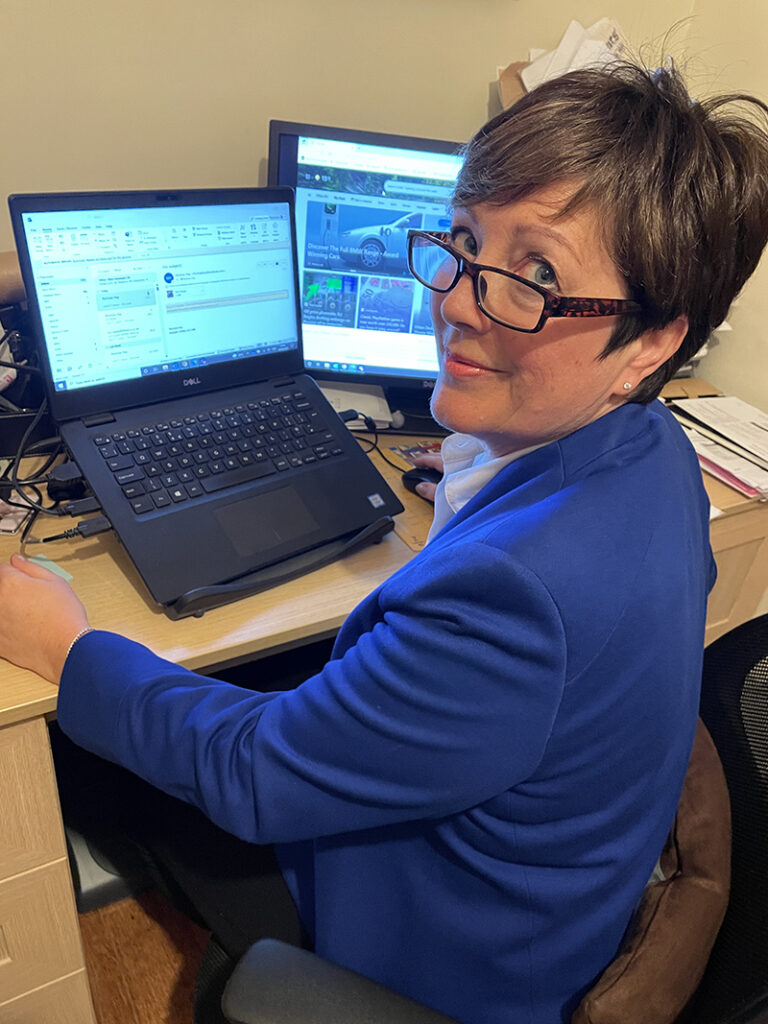Nicki Hay is the second ever chair – and its first female chair – of the Association of Employment and Learning Providers in its history. Can her messaging make the government credit ITPs at last?
“I like to get things done,” Nicki Hay, the new chair of the Association of Employment and Learning Providers, tells me. “I’m very much about bringing networks of people together to talk to each other.”
So far, so expected. FE Week first interviewed Hay in 2016, and since then she has gone on to be appointed chair of an organisation representing about 800 independent training providers. It’s a not insignificant role – ITPs now deliver seven out of ten apprenticeships. She’s taking over from long-standing chair Martin Dunford, who has been in post for a mindboggling 18 years, and as such is ushering in a new era for AELP.
Alongside Jane Hickie, chief executive, and Alex Khan, vice chair, Hay is all about connections ̶ improving member links with employers and ministers. Networking is in the blood of the organisation.
And Hay has a great track record on this. Back in 2016, she voluntarily began linking up job centre coaches with training providers, unprompted and with no government contract.
She’d spotted that many coaches in London’s job centres didn’t know too much about apprenticeships, and many unemployed people appeared to be missing out on opportunities.
“So I worked with the National Apprenticeship Service [NAS], and we trained up ‘apprenticeship coaches’ in every job centre across London,” explains Hay, evidently proud. “We educated them about apprenticeships and how to network with providers.”
It’s not as if Hay wasn’t busy herself ̶ she was running a training provider she had founded at the time. Spearheading the project alongside her was Carolyn Savage, then at the NAS and now head of apprentice participation at the Education and Skills Funding Agency.
They approached job centre leads across London to find an “apprenticeship champion”. Hay estimates that over a year and a half, apprenticeship starts from job centres in London rose by ten per cent.
But the pandemic, and trying to do it all voluntarily, led to the initiative “fizzling out”, warns Hay. She is trying to get it back off the ground now.
It seems a no-brainer, I comment. Shouldn’t there be a proper national contract or funding to train apprenticeship coaches in job centres?
Hay nods. “The Department for Work and Pensions and Department for Education need to make sure there’s a policy to make that happen. It shouldn’t be that someone from the National Apprenticeship Service and an ITP come in and run that.”

It’s not the only area where Hay has stepped in directly to make changes. In 2018 she began working with headteachers and students aged 14 to 19 in Hounslow, west London.
She and a group of training providers devised a free “calendar of activities” for the schools, which aimed to increase exposure to and the status of vocational education among staff, students and parents.
A particularly successful initiative was introducing students to at least ten apprentices.
“We took the apprentices from different industries along to the schools, and the students got cards with questions to ask the apprentices,” smiles Hay. “We had a bell, and the students moved around each of the ten apprentices, asking them questions.
“So when they came away, they knew at least ten different industries, and how they got into the apprenticeship.”
Of course, the programme benefited the training providers too – Hay says the project was partly prompted by ITPs struggling to get young people in the capital into apprenticeship vacancies. But it’s an all-round win-win. Again it’s just a shame that some of Hay’s ideas are not turned into a national programme.
Rolling up her sleeves to juggle multiple plates is a lesson Hay learned from her mum. She was born in Surrey, and her dad was a draughtsman who designed oil rig infrastructures. Her mum a senior manager for Parity Training, a big project management training organisation. She was a key influence in Hay’s life.
“My mother was a real advocate for having a career and a family, and I got that ethos and work ethic from her,” she tells me. “My parents were on a par as breadwinners.” Her own daughters have proven ambitious too, with one completing a level 7 CIPD apprenticeship (an HR strategy qualification) and the other taking the higher education route, studying neuroscience.

After A-levels in PE, English and geography at Farnborough Sixth Form College, Hay went to work at the Co-Op bank. After that she became an insurance underwriter, sitting the exams at 22 years old. “I was the third woman to take the exams,” she tells me. “On the underwriting floor I operated on, there were only two women among a couple of hundred men.”
I was one of two women among a couple of hundred men
She moved on to become a senior manager with ASM, a membership organisation for the freight-forwarding sector (now known as logistics). Age just 26, she was helping provide services to companies moving goods through customs. “And that’s how I got into apprenticeships!” she tells me happily.
She and her team realised there was an ageing workforce, so they worked with a sector skills council to design a youth training scheme (or YTS), a kind of semi-apprenticeship first introduced by Margaret Thatcher in 1983 (and sometimes criticised that they amounted to cheap labour for employers).
But soon ASM – later sold to Quantica Training – was running the largest contract in London for apprenticeships.
Then in 2009 Hay went solo, starting her own provider, Outsource Training and Development.
Again, she showed a flair for business. Focusing on apprenticeships for the aviation sector, the company expanded to 140 staff and worked with British Airways, Virgin and easyJet.
It taught about 800 learners annually, according to Hay, and in 2016 she sold the business for £3 million to Seetec Group (now Seetec Outsource). She stayed for three years, before being headhunted in 2019 for her current role as chief operating officer at Estio Training, a sub-contractor of Seetec Outsource that she knew well.
Interestingly, Estio Training, which specialises in digital apprenticeships, was bought by BPP education group in 2021 – which is the only training provider to hold university status, says Hay. It means the provider can offer apprenticeships from level 2 to level 7.
“They’re really unique – it’s really exciting. With the future, there’s obviously a massive focus on higher level skills,” she says, before adding: “But that doesn’t mean I’ve forgotten my roots, and how important it is we have level 2 programmes available.”

Now, big policy challenges are on Hay’s plate. She’s worried about the impact of the pandemic on apprenticeship starts, and the fact that small and medium-sized enterprise sector have “disengaged” from the apprenticeship levy, because of the “clunky” digital accounts they must use.
This in turn is impacting on ITPs, who try to sort the issues “on behalf of SMEs,” says Hay. It’s not sustainable, so AELP will be “lobbying to make the digital account simplified for SMEs to use”.
Other priorities include lobbying the DfE to ensure its review of level 2 and below qualifications (the deadline for responses is April 27) does not “negatively impact on sectors, or on opportunities for learners”.
Another interesting point she makes is about the ITP market (already slimmed down on the adult education budget last year by almost 60 per cent).
Overall, she says, 80 per cent of ITPs are currently grade 1 or 2 under Ofsted – for colleges it is 81 per cent (however, almost double the proportion of colleges hit a grade 1: 18 per cent as opposed to ten per cent of ITPs).
But Hay warns: “When the market was opened up under the apprenticeship levy, a lot more providers entered the market. If you split out the new providers from the existing providers, you’d see there’s really high quality with the existing providers operating in that space, which has been a bit distorted with some of the new providers coming in.”
This seems to be backed by the data. Ofsted’s annual report showed that 24 per cent of providers that had a new provider monitoring visit in 2020-21 had at least one ‘insufficient’ judgment. While not strictly comparable, that’s much higher than the three per cent of ITPs to receive an ‘inadequate’ overall judgment for full inspections.
Just this year chief inspector Amanda Spielman said, “We would be very keen to see that proportion decrease, and ideally disappear.”
So what’s to be done? Hay says AELP will support all members to improve, but adds “sometimes it’s about exiting that provider out of the market”.
It’s admirable honesty.
However, as with many ITP bosses, Hay remains fundamentally frustrated at “the lack of recognition for the good work of ITPs” by the DfE and media, who she says focus on colleges (one whole section in AELP’s latest report is called “inequitable treatment”).
There’s a lack of recognition for the good work of ITPs
But there is an important point to press back at AELP here. FE Week has sent out various round robin missives to ITP bosses, as well as college bosses, asking for contributions to its ‘Staffroom’ column and podcast. College leaders usually reply enthusiastically, putting forward staff and students to discuss tricky topics, often within a day.
But with a couple of exceptions, ITPs FE Week has contacted have largely said they either cannot think of anyone to put forward, or have not replied. Similarly, FE Week has requested sector data from AELP that it does not have, while the Association of Colleges has its equivalent.

However FE Week understands most independent training providers do not have large dedicated marketing and communications teams, making press responses at short notice challenging. This does not, of course, indicate a lack of interest in doing so from providers!
Hay also says she wants to “get ministers to understand independent training providers better”. Yet she got her well-deserved MBE for improving the lives of learners through her job centre and school initiatives.
If ITPs start banging on about learners, rather than themselves, I suspect they will be listened to more often. Having an important message to shout is a lot more powerful than asking to be taken notice of.
It’s a challenge I will leave with Hay. Ultimately, it’s clear that AELP have a super-competent pair of hands at the wheel.
Whatever suggestions she gives the DfE about apprenticeships, they’d be fools not to listen.









Your thoughts